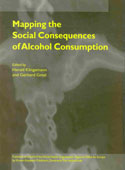Mapping the social consequences of alcohol consumption

Edited by Harald Klingemann & Gerhard Gmel
Published by Kluwer Academic Publishers
2001, ix + 170 pages
ISBN 0 7923 6740 5
€60.00/ £41.00
Research on the consequences of alcohol consumption has traditionally focused mainly on the health aspects of alcohol consumption or effects that can be most easily quantified or measured. Yet alcohol has many consequences that can be characterized as "social" in nature and that are not just medical or directly health-related. Such consequences include violence, crime, and psychosocial factors. The increasing relevance of the non-medical consequences of alcohol consumption is also reflected in the second European Alcohol Action Plan 2000-2004 of WHO, which aims at the prevention and reduction of harm done by alcohol to the health and wellbeing of individuals, families and communities.
This book provides a comprehensive overview of the social consequences of alcohol consumption at the individual, group, organizational and societal level. Timed to coincide with the highly successful WHO European Ministerial Conference on Young People and Alcohol held in Stockholm in February 2001, it is the result of a two-year collaborative study under the leadership of the WHO Regional Office for Europe, with the participation of alcohol researchers from Finland, Germany, Norway, Scotland and Switzerland.
Although the book was written by experts in the field, it is targeted not only at scientists but at all people dealing with alcohol-related problems in practice.



